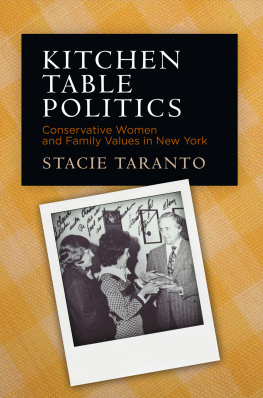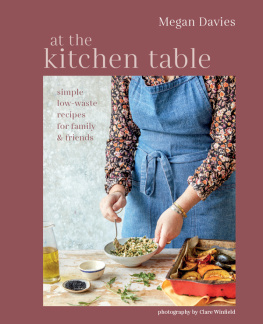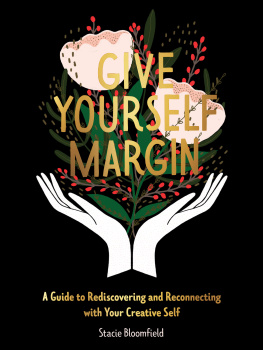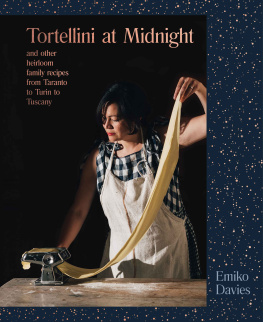Stacie Taranto - Kitchen Table Politics
Here you can read online Stacie Taranto - Kitchen Table Politics full text of the book (entire story) in english for free. Download pdf and epub, get meaning, cover and reviews about this ebook. year: 2019, publisher: University of Pennsylvania Press, Inc., genre: Home and family. Description of the work, (preface) as well as reviews are available. Best literature library LitArk.com created for fans of good reading and offers a wide selection of genres:
Romance novel
Science fiction
Adventure
Detective
Science
History
Home and family
Prose
Art
Politics
Computer
Non-fiction
Religion
Business
Children
Humor
Choose a favorite category and find really read worthwhile books. Enjoy immersion in the world of imagination, feel the emotions of the characters or learn something new for yourself, make an fascinating discovery.
- Book:Kitchen Table Politics
- Author:
- Publisher:University of Pennsylvania Press, Inc.
- Genre:
- Year:2019
- Rating:3 / 5
- Favourites:Add to favourites
- Your mark:
- 60
- 1
- 2
- 3
- 4
- 5
Kitchen Table Politics: summary, description and annotation
We offer to read an annotation, description, summary or preface (depends on what the author of the book "Kitchen Table Politics" wrote himself). If you haven't found the necessary information about the book — write in the comments, we will try to find it.
Kitchen Table Politics — read online for free the complete book (whole text) full work
Below is the text of the book, divided by pages. System saving the place of the last page read, allows you to conveniently read the book "Kitchen Table Politics" online for free, without having to search again every time where you left off. Put a bookmark, and you can go to the page where you finished reading at any time.
Font size:
Interval:
Bookmark:

Kitchen Table Politics
POLITICS AND CULTURE IN MODERN AMERICA
Series Editors: Margot Canaday, Glenda Gilmore,
Michael Kazin, Stephen Pitti, Thomas J. Sugrue
Volumes in the series narrate and analyze political and social change in the broadest dimensions from 1865 to the present, including ideas about the ways people have sought and wielded power in the public sphere and the language and institutions of politics at all levelslocal, national, and transnational. The series is motivated by a desire to reverse the fragmentation of modern U.S. history and to encourage synthetic perspectives on social movements and the state, on gender, race, and labor, and on intellectual history and popular culture.
KITCHEN TABLE POLITICS
Conservative Women and Family Values in New York
Stacie Taranto

UNIVERSITY OF PENNSYLVANIA PRESS
PHILADELPHIA
Copyright 2017 University of Pennsylvania Press
All rights reserved. Except for brief quotations used for purposes of review or scholarly citation, none of this book may be reproduced in any form by any means without written permission from the publisher.
Published by
University of Pennsylvania Press
Philadelphia, Pennsylvania 19104-4112
www.upenn.edu/pennpress
Printed in the United States of America on acid-free paper
10 9 8 7 6 5 4 3 2 1
Library of Congress Cataloging-in-Publication Data
ISBN 978-0-8122-4897-5
For my family, and the ability for all people and families to live as they choose
CONTENTS
NOTE ON TERMS
Certain key terms and organizing principles appear throughout the book. The movements, groups, and participants they refer to were not as homogeneous as the blanket terminology used to describe them suggests. The term New York refers to New York State, not New York City, which is labeled as such. Derivations of pro-family or family values were used for convenience. Unless otherwise noted, references to feminists relate to (white) liberal, as opposed to radical, feminism because liberal feminists from organizations such as the National Organization for Women were more immersed in the electoral political arena covered here. Liberal feminists offended the first-generation suburban homemakers at the center of this narrative, as women of a similar racial and class demographic who were supposed to be their friends and neighbors, not political adversaries.
Perhaps no issue is more volatile than debates over whether abortion should be legal, which necessitated a careful parsing of words. Opponents of legal abortion are labeled as anti-abortion. This term does not imply that advocates of legal abortion were necessarily pro-abortion. Proponents advocated abortions legality; few took the actual procedure lightly. The more politicized pro-life and pro-choice descriptors appear only in quotations from activists. Opponents of legal abortion chose the term pro-life to reflect their belief that unborn fetuses were akin to, and thus should be afforded the same legal rights as, those living outside the womb. Proponents of legal abortion, particularly feminists, saw legal abortion as a fundamental righta decision that only a woman, whose body and life were directly affected by pregnancy, should make, as the pro-choice marker denotes. These terms reflect two very different outlooks on abortion, the origins of which unfold here.
INTRODUCTION
Inventing a New Politics of Family Values
The inspiration for this book grew from going door-to-door in 2004 collecting donations for the Democratic National Committee on behalf of John Kerrys presidential campaign. I was disappointed to be stationed in Rhode Island instead of an exciting swing state like Ohio, but being there made the most sense. I was about to begin graduate school in the area, where I intended to research American women during World War II. That plan shifted after canvassing Rhode Island for Democratic cash. Wealthier suburban neighborhoods were our best bet. Anecdotally, it seemed that a Volvo or Subaru in the driveway guaranteed hundred-dollar checks from people eager to expound on President George W. Bushs worst policy blunders.
We also visited many lower-middle- and working-class neighborhoodsvoters who had been the backbone of the New Deal coalition, yet whose support for the party was less assured in recent years. As nave young staffers, we thought we could convince this demographic to open their wallets. These were neighborhoods likely to benefit, for example, from Kerrys promise of national healthcare. We suspected that issues such as abortion might repel some of these voters. Still, this was the blue state of Rhode Island. These were mostly Catholic families, not the Evangelicals our friends were confronting elsewhere. We were wrong.
Older women, especially ones with rosary beads and other visible Catholic insignia, were the most hostile. They said they would never vote for Kerry, a fellow Catholic, because he backed legal abortion. They liked his economic message and used to be Democrats, but what they called family values issues now took precedence. The women had heard much of the same from their Catholic leaders and had been a target of the Republican Party for decades. When, I wondered, did this concept of family values emerge, and why did it become wedded to opposing legal abortion and championing the traditional nuclear family, instead of reforms such as national healthcare? And why vote for these issues when your economic position was not wholly secure?
That experience revealed what I wanted to study in graduate school, a project that became this book. I would investigate the origins of family values politics, shining a spotlight on everyday lay Catholic women like those I had met. Their language seemed aligned with the much-discussed (Protestant Evangelical) Religious Right working in large national religious and antifeminist organizations, yet they were understudied by the media and scholars alike.
Women, Kitchen Tables, and Political Change in the Seventies
My initial questions led to kitchen tables across suburban New York in the seventies. Archival research, interviews, and never-before-seen documents from basements and attics across the state revealed a small but incredibly effective group of ordinary, mostly Catholic women who redirected American conservatism from the grassroots. Throughout the seventies, topics that never had been widely debated in public beforesuch as how to divide childcare between the sexes or whether to become a parent at allmoved to the forefront of politics as modern feminist movements and related abortion reforms accelerated. As this occurred, some women felt that their families and homes were under siege. With no formal political experience, they gathered around kitchen tables and used the resources around them to fight back. This is the story of Catholic women such as Ellen McCormack and Jane Gilroy from Merrick, Long Island, who met when their parish priest started a dialogue group in the late sixties that mostly attracted housewives like them. They soon learned of efforts in the state legislature to legalize abortion. Echoing their Catholic leaders, many equated legal abortion with state-sanctioned murder and agonized over making it easier for women to evade their maternal responsibilities. After legislators passed an abortion reform law in 1970, the women formed the New York State Right to Life Party and began running anti-abortion candidates for elective office. It is also the story of women like Phyllis Graham from a nearby suburb of New York City. Graham remembers sitting at her kitchen table depressed after abortion was legalized. Anti-abortion activism through her Catholic parish evolved into opposing the states Equal Rights Amendment; by the late seventies, she was hosting a popular antifeminist local talk radio show.
Font size:
Interval:
Bookmark:
Similar books «Kitchen Table Politics»
Look at similar books to Kitchen Table Politics. We have selected literature similar in name and meaning in the hope of providing readers with more options to find new, interesting, not yet read works.
Discussion, reviews of the book Kitchen Table Politics and just readers' own opinions. Leave your comments, write what you think about the work, its meaning or the main characters. Specify what exactly you liked and what you didn't like, and why you think so.












